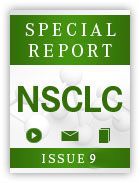New Options Possible in Patients With NSCLC and Brain Metastases
A study published in the Journal of Clinical Oncology found that an EGFR inhibitor, erlotinib, was well tolerated in combination with whole-brain radiation therapy for patients with brain metastases from NSCLC.
A study published in theJournal of Clinical Oncology1found that an epidermal growth factor receptor (EGFR), erlotinib, was well tolerated in combination with whole-brain radiation therapy (WBRT) for patients with brain metastases from nonsmall cell lung cancer (NSCLC).
Through the phase II trial, researchers examined the use of erlotinib with WBRT in an effort to extend survival time for patients with NSCLC, which was based on the understanding that activatedEGFR’s contribute to radiation resistance. In patients with NSCLC, brain metastases are the leading cause of death.
Lung cancer continues to be the leading cause of cancer-related mortality among men and women. In the United States an estimated 222,520 newly diagnosed lung cancer cases are diagnosed each year. Prognosis for advanced lung cancer remains grim for patients with NSCLCabout 20% to 40% of patients with NSCLC develop brain metastases at some point during their prognosis.
Current treatment options for brain metastases among patients with NSCLC include WBRT, stereotactic radiosurgery, and surgical resection or some combination thereof; however, median survival time for patients who seek WBRT generally range anywhere from 3 to 6 months depending upon individual age, performance, and the location of metastatic lesions.
In the phase II trial, median overall survival (OS) rate for study participants was 11.8 months. The OS rates for the 6-month mark, the 1-year mark, and the 2-year mark were found to be 68%, 50%, and 24%, respectively.
The study, conducted by the University of Arizona and the MD Anderson Cancer Center of The University of Texas examined 40 patients who were given a loading dose of erlotinib for 6 days and then a dose of erlotinib per day concurrently with WBRT. Following whole-brain radiation therapy, patients received maintenance erlotinib until the disease progressed or until adverse events became intolerable for the patient.
Additionally, researchers found a particular benefit for patients withEGFRmutations. Previous studies have indicated thatEGFRmutations can be found in about 10% to 15% of patients with NSCLC, yet researchers found the rate to have nearly tripled to 50% in the studied patient group.
EGFRmutation testing has been commonplace in diagnosing and treating NSCLC, for which patients are stratified depending upon their levels of mutation. This study supports the notion that mutation status seems to have a strong correlate response to antiEGFR-targeting agents.
Researchers assert that tumors withEGFRmutations have a “different biologic profile or path of spread than do wild-typeEGFRtumors.” Studies suggest that tumors with a predominantly mesenchymal phenotype do not respond as well to EGRF-targeting agents as do tumors with a stronger epithelial phenotype. As a result, patients withEGFRmutations may be more prone to brain metastases than patients without mutated tumor types.
“Although these findings are thought provoking, they must be interpreted cautiously because of the small numbers of patients and lack of randomization,” the authors wrote in their report. The researchers added that the study could also have been impacted by a negative selection bias, because MD Anderson only treats patients with four or fewer CNS lesions with a stereotactic approach and because of the changing use of erlotinib in treatment since the beginning of the study.
Erlotinib is currently approved for use in initial treatment for patients with a new diagnosis ofEGFR-mutated lung cancer, which researchers warned would likely lead to different outcomes than those found with patients in the phase II trial.
“This trial of concurrent erlotinib and radiation therapy for the initial treatment of brain metastases from NSCLC showed that this combination was safe and well tolerated,” the authors added. “Survival times for all patients in this trial exceeded those expected from historical controls, and the benefits seemed exceptionally high for patients withEGFRmutation rates.”
References
- Welsh J, Komaki R, Amini A et al. Phase II trial of erlotinib plus concurrent whole-brain radiation therapy for patients with brain metastases from non-small-cell lung cancer.J Clin Oncol. 2013;31(7):895-902. doi:10.1200/jco.2011.40.1174.

Survivorship Care Promotes Evidence-Based Approaches for Quality of Life and Beyond
March 21st 2025Frank J. Penedo, PhD, explains the challenges of survivorship care for patients with cancer and how he implements programs to support patients’ emotional, physical, and practical needs.
Read More